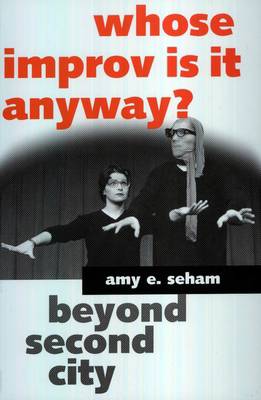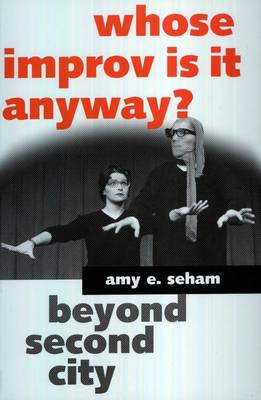
- Retrait gratuit dans votre magasin Club
- 7.000.000 titres dans notre catalogue
- Payer en toute sécurité
- Toujours un magasin près de chez vous
- Retrait gratuit dans votre magasin Club
- 7.000.0000 titres dans notre catalogue
- Payer en toute sécurité
- Toujours un magasin près de chez vous
Description
On both sides of the stage improv-comedy's popularity has increased exponentially throughout the 1980s and '90s and into the new millennium. Presto! An original song is created out of thin air. With nothing but a suggestion from the audience, daring young improvisers working without a net or a script create hilarious characters, sketches, and songs. Thrilled by the danger, the immediacy, and the virtuosity of improv-comedy, spectators laugh and cheer. American improv-comedy burst onto the scene in the 1950s with Chicago's the Compass Players (best known for the brilliant comedy duo Mike Nichols and Elaine May) and the Second City, which launched the careers of many popular comedians, including Gilda Radner, John Belushi, and Mike Myers. Chicago continues to be a mecca for young performers who travel from faraway places to study improv. At the same time, the techniques of Chicago improv have infiltrated classrooms, workshops, rehearsals, and comedy clubs across North and South America, Europe, Australia, and Japan. Improv's influence is increasingly evident in contemporary films and in interactive entertainment on the internet. Drawing on the experiences of working improvisers, Whose Improv Is It Anyway? provides a never-before-published account of developments beyond Second City's mainstream approach to the genre. This fascinating history chronicles the origins of "the Harold," a sophisticated new "long-form" style of improv developed in the '80s at ImprovOlympic, and details the importance and pitfalls of ComedySports. Here also is a backstage glimpse at the Annoyance Theatre, best known on the national scene for its production of The Real Live Brady Bunch. Readers will get the scoop on the recent work of players who, feeling excluded by early improv's "white guys in ties," created such independent groups as the Free Associates and the African American troupe Oui Be Negroes. There is far more to the art of improv than may be suggested by the sketches on Saturday Night Live or the games on Whose Line Is It Anyway? This history, an insider's look at the evolution of improv-comedy in Chicago, reveals the struggles, the laughter, and the ideals of mutual support, freedom, and openness that have inspired many performers. It explores the power games, the gender inequities, and the racial tensions that can emerge in improvised performance, and it shares the techniques and strategies veteran players use to combat these problems. Improv art is revealed to be an art of compromise, a fragile negotiation between the poles of process and product. The result, as shown here, can be exciting, shimmering, magical, and not exclusively the property of any troupe or actor. Amy E. Seham is an assistant professor of theater and dance at Gustavus Adolphus College in St. Peter, Minnesota. In Connecticut she has served as artistic director of Performance Studio in New Haven and of Free Shakespeare on the Green in New Haven and Stamford. Second City stars-(front) Holly Wortell and Joel Murray; (back) Chris Farley, Tim Meadows, Judith Scott, David Pasquesi, and Joe Liss-courtesy of Jennifer Girard Studio
Spécifications
Parties prenantes
- Auteur(s) :
- Editeur:
Contenu
- Nombre de pages :
- 258
- Langue:
- Anglais
- Collection :
Caractéristiques
- EAN:
- 9781578063413
- Date de parution :
- 25-09-14
- Format:
- Livre broché
- Format numérique:
- Trade paperback (VS)
- Dimensions :
- 149 mm x 230 mm
- Poids :
- 421 g

Les avis
Nous publions uniquement les avis qui respectent les conditions requises. Consultez nos conditions pour les avis.






